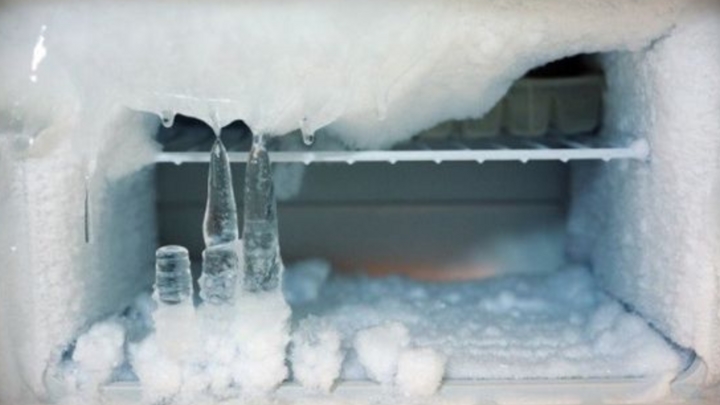After some time in use, many refrigerators develop a thick, white layer of frost. This frost becomes increasingly thick and hard, affecting the functionality of the refrigerator.
Frost often forms in patches on the walls of the refrigerator, and even sticks to food in the freezer compartment. The thicker the frost in the refrigerator, the lower its cooling and food preservation capabilities, and the smaller the storage space becomes. In addition, it also consumes more electricity.
Why does a refrigerator frost up?
There are many reasons why a refrigerator frosts up, including:
– Putting hot food in the refrigerator and frequently opening it: Frequently opening the refrigerator and putting hot food in it increases the moisture in the refrigerator compartment, preventing the appliance from cooling properly. The moisture that enters the refrigerator in this way freezes into frost.
– The refrigerator door is not properly closed: Moisture from the outside getting in is also a cause of frost in the refrigerator.
– Not cleaning the refrigerator regularly: If you do not clean your refrigerator regularly, food, dirt, and oil spills can cause the gears to wear out or get stuck, drastically reducing heat transfer, which in turn causes the frost layer to thicken.
– The defrost timer relay is broken: In most refrigerators, the timer is located in the crisper drawer or at the back of the refrigerator, in the electrical box next to the compressor. Its function is to switch the compressor to defrost mode. When this important component breaks, the defrost process stops. The burned-out motor coil causes the ice in the refrigerator to freeze solid, forming layers of frost.
– The evaporator or condenser in the refrigerator is not connected, or the electrical fuse is blown, which can also cause the refrigerator to frost up.
A thick layer of frost in the refrigerator can be quite annoying for users, as it can:
Reduce usable space
Cause noise from the fan
Reduce cooling efficiency as well as food preservation capabilities.
Consume more electricity without being very efficient.

Why does a refrigerator frost up? Putting in hot food and not cleaning the refrigerator regularly can also be causes. (Photo illustration: Pinterest)
Is it advisable to remove the frost in the refrigerator?
Given the aforementioned causes and effects, it is essential and advisable to remove this frost as soon as possible to restore the refrigerator to its proper function, increase food preservation efficiency, and reduce energy consumption.
How to remove frost from a refrigerator:
First, you need to remove all the food from the refrigerator, including that in the freezer and refrigerator compartments.
Open all the refrigerator doors and place a cup of hot water inside to melt the frost with the steam. A faster way is to use a fan or hair dryer to melt the frost more quickly.
After all the frost has melted, use a clean cloth to wipe down all surfaces of the refrigerator; you can remove the shelves and wash them before drying them and putting them back in the refrigerator.
Put the food back in the refrigerator and use it as normal. Observe whether your refrigerator is working more efficiently after that.
If you find that your refrigerator is frosting up due to the aforementioned causes, call an electrician to replace the faulty parts so that the refrigerator can operate normally.
In addition, to keep your refrigerator working properly and prevent frost build-up, you should note the following:
According to VTC news
A thick layer of frost can reduce usable space, cause fan noise, decrease cooling efficiency and food preservation capabilities, and lead to higher electricity consumption.
Yes, it is advisable to remove frost as soon as possible. By doing so, you will restore your refrigerator’s proper function, increase food preservation efficiency, and reduce energy consumption.
- Remove all food from the refrigerator and freezer compartments.
- Open all doors and place a cup of hot water inside to help melt the frost. Alternatively, use a fan or hair dryer to speed up the process.
- Once the frost has melted, wipe down all surfaces with a clean cloth. You can also remove and wash the shelves before drying and replacing them.
- Put the food back and use the refrigerator as normal, noting any improvements in efficiency.
If you suspect that the frosting is due to a faulty part, such as a broken defrost timer relay, call an electrician to replace the part so that your refrigerator can operate normally again.
- Adjust the temperature to the appropriate levels: 3-5 degrees C for the refrigerator compartment and around -18 degrees C for the freezer.
- Clean and defrost your refrigerator regularly to allow cold air to circulate evenly and preserve food better.
- Maintain your refrigerator every 3-4 months to ensure the cooling system operates normally.





































